- Home
- Vicki Delany
A Curious Incident Page 2
A Curious Incident Read online
Page 2
The door opened and a woman peered out. She was in her mid-forties, nicely dressed in a typical summer-on-Cape-Cod way in white capris and a blue-and-white-striped T-shirt—Tommy Hilfiger perhaps. She was about my height, five eight, but quite a bit heavier than she probably would have liked. Gold hoops adorned her ears, and a heavy gold chain hung around her neck. Her feet were bare, showing nails painted a bright red. Her glossy blonde hair, the color owing more to a bottle than to the sun, was pulled back into a high, sleek ponytail. Her lipstick was a fresh pale pink, and her recently applied manicure matched her pedicure.
Her clothes looked expensive, but they were too tight on her, particularly around the hips and stomach. She’d obviously put on weight since buying them, and the fact that she hadn’t replaced them meant she’d been too busy to go shopping; she couldn’t afford new clothes of the quality she liked; or she was in denial about having gained weight.
“Yes?” she said.
“Is Lauren at home?” My bundle squirmed, and I held it tight.
She narrowed her eyes. “Why do you want to know?”
“I’m Gemma Doyle from the Sherlock Holmes Bookshop on Baker Street. Lauren came to see me earlier today.”
“If it was about that cat, I’m sorry. I wish I’d never bought the dratted thing. I told Lauren to keep it inside, but she forgot—she can be such a scatterbrain —and it got out the day before yesterday. Lauren’s been in tears ever since. Nothing but high drama. As if I don’t have more important things to worry about.”
“Uh, okay. But I would like to talk to her. May I come in? Are you her mother?”
“I am. I’m Sheila Tierney.” She spoke in a flat voice and made no attempt to crack a neighborly smile, to call Lauren, or to invite me in. What, I thought, is this woman’s problem?
A tiny white paw emerged from my bag, and claws scratched at the air. Sheila Tierney blinked. “Oh,” she said, “is that …?”
“Lauren?” I said.
The door opened, Sheila stepped back, and I came in. I closed the door behind me.
“Lauren!” Sheila called. “Lauren, get down here.”
A tear-streaked face and tousled blonde hair appeared at the top of the steps.
“I brought you something.” I opened the bag, and Snowball leapt out. She practically flew across the room. Lauren did fly down the stairs, screaming with joy as only an eleven-year-old girl can. She scooped the kitten up and held her so tightly I feared the little cat would be crushed.
“You found her!” Lauren squealed. “You found her. I knew you could do it!”
“Glad to be of help.” I was feeling quite proud of myself. I hadn’t done anything except follow my dog, but no one had to know that.
“Thank you, Ms. Doyle. I hate to be rude,” Sheila said rudely, “but I’m on my way out.” She opened the door.
“Wait! Wait!” Lauren called. “I said I’d pay you. I’ll get your money.”
“No need,” I said. “This one’s on me.”
She gave me a radiant smile. I swear little Snowball smiled also. Sheila pointedly looked at her watch, telling me in no uncertain terms to be on my way.
“I’ll never forget you,” Lauren said in a low voice.
I touched my index finger to my forehead. “Gemma Doyle, Consulting Detective, at your service.”
Chapter Three
“I am not a consulting detective.”
“You might not want to be, but she thinks you are,” Jayne said.
I put my elbows on the table and rubbed at my always-out-of-control, curly dark hair, making it even more out of control. I groaned. I had ten dollars I didn’t want in my pocket, and I’d agreed to do something I knew I’d very much regret.
A week had passed since the Snowball incident. I’d proudly told Ashleigh, Jayne, Irene, Moriarty, and anyone else who happened to wander within hearing distance how I’d located the missing cat. “It’s simply a matter of paying attention to your surroundings,” I said modestly, “and picking up on the small clues.”
The following day, Lauren had come into the store with a cup of tea and a blueberry muffin for me, along with her thanks. I was touched when Fiona later told me the girl had asked her what I liked for a snack, and then bought it for me. Lauren told me Snowball was fully recovered from her ordeal.
I thanked her for the treat, waved goodbye, and assumed that was the end of that.
It wasn’t.
This afternoon, Lauren returned to the shop, once again wanting to retain my services.
This time, she wasn’t asking me to locate a missing kitten, but to clear her mother of a murder charge. She’d offered me ten dollars as an advance on my fees.
“She said she can’t pay any more than that now,” I told Jayne, “but as soon as she’s old enough, she’ll get a job and pay me. With interest.”
Jayne’s face twisted in concern. “The poor thing. What are you going to do, Gemma?”
I pushed my plate to one side. We were in the tearoom, seated at the small table tucked into a window alcove overlooking the bustle of Baker Street. Mrs. Hudson’s closes at four o’clock, and the last few customers were finishing their tea and settling their bills. This was a relaxing room, designed to be so: the walls above the white wainscoting were papered in soft shades of sage green and peach. The artwork consisted of paintings of castles and thatched-roof cottages nestled in verdant pastoral landscapes, and a portrait of Queen Elizabeth II was prominently hung on the back wall. Open shelves displayed rows of bone china teacups, teapots, and an assortment of locally sourced jams, jellies, and preserves, which we offered for sale. The delicious scents of warm baking being prepared for tomorrow wafted from the kitchen.
“I called Irene and asked her to join us,” I said. “She’ll be able to give us more details than I’ve read in the paper. I can’t imagine Ryan’ll be happy to hear that I’ve been hired to interfere.”
Detective Ryan Ashburton is the man I love, and I know he loves me. But our relationship is difficult, and more than once my involvement in his cases has threatened the stability—what little of it there is—of our relationship.
“You told Lauren you’d help, then?”
“What could I say, Jayne?” I thought of Lauren’s tear-streaked face, the fear in her eyes, the brave tilt of her chin, the adoring way the little girl had gazed up at me. “I told her I’d find out what I could, but I made absolutely no promises. What did you get up to last night?”
“Nothing much.” Jayne’s eyes slid to one side. Jayne was my best friend as well as my business partner. She was tiny and blonde and blue-eyed, with a heart-shaped face that turned men’s heads wherever she went. She was one of the hardest-working people I knew, and probably the kindest. The Emporium closes at five on Sundays, and yesterday I’d suggested Jayne and I go for a drink down by the pier. She’d said she had plans and scurried away.
“What’s ‘nothing much’ mean?” I asked. “You said you were going out.”
“I was tired. That’s all.” The bells over the door tinkled, and Jayne said, “Oh good. Here’s Irene now.”
Irene Talbot dropped into a chair next to Jayne. “What a mess.”
“Have a tart.” I pushed my untouched plate in front of her.
“Don’t mind if I do.” She selected a tiny, perfect raspberry pastry.
“Coffee, Irene?” Fiona called across the room.
“Thanks. Okay, Gemma, I’m here—what do you want to know? I can’t believe Lauren came to you for help.”
“For which thank you very much. Not. It was bad enough getting me involved in the case of the missing cat, never mind this.”
“I didn’t intend—”
I waved a hand in the air. “No matter. It’s done. Tell me everything you know. I read the account in the paper, but pretend I don’t know anything.”
Irene took a bite of her tart and thought. “Lauren’s mother, Sheila, is my stepsister. Her father’s my mom’s second husband. My dad died when I was in fifth grad
e, and my mother married again two years later. Sheila’s five years older than I am. We’ve never been at all close—natural enough considering the age difference and that she left home for college not long after our parents married—but living in the same town as we do, we get together at family events and such. Mom and Ralph—that’s Sheila’s dad—moved to Arizona a few years ago, but they visit regularly. I might not care for Sheila, but I adore Lauren. She’s smart, funny, athletic, and very, very sweet. Sheila—none of the above. I’ve been spending more time with Lauren this summer than usual because things haven’t been so good at home. Lauren doesn’t gossip about her parents, but I can’t help picking up on things. Her dad—his name’s David Tierney—has been away from home a lot. He says he’s traveling on business, but Sheila accused him of having an affair. Specifically with a woman by the name of Anna Wentworth. Anna and Sheila are—I guess I should say they were—both members of the West London Garden Club.”
“Anna being the recently deceased,” Jayne said.
“Right. Her supposed relationship with David is part of the reason Sheila’s being questioned about the murder.” Irene stopped talking when Fiona brought her coffee.
“My sister-in-law’s a member of that club,” Fiona said. “It’s a hotbed of petty jealousy, bitter rivalry, and assignations under the rhododendrons, if you listen to her.”
“And I might,” I said.
“You can bet your bottom dollar, or the last clump of dirt at the bottom of your compost bin, they’re talking about nothing other than Sheila Tierney today. More sandwiches? We have a few left.”
“Thanks,” Irene said. “I didn’t have time for lunch.”
The last of the customers left. Fiona went into the kitchen to get the sandwiches, and the other tearoom assistant, Jocelyn, began stacking chairs onto tables prior to doing the vacuuming.
“Were they?” Jayne sipped at her tea.
“Were who what?” Irene said.
“Were David Tierney and this garden club member having an affair?”
“At the time I didn’t know, and I figured it was none of my business. But from what everyone’s saying since Anna’s murder, it doesn’t seem so.”
“Anna Wentworth might have been a diversion,” I said, “if his affair was with someone else. Or perhaps there was never any affair. Or they might have been discreet about it, but Sheila knew. The wife usually does. Let’s start at the beginning. What did you tell Lauren that made her think I could help her?”
“You did help her,” Jayne said. “And now she’s hoping you can help her again.”
“Lauren was at my house one night a couple of weeks ago,” Irene said, “and I found a Sherlock Holmes movie on Netflix.”
“Which one?” I asked.
“Does it matter?”
“‘It has long been an axiom of mine that the little things are infinitely the most important.’”
“Huh?”
“‘A Case of Identity.’ Meaning I won’t know if something matters until it does. What was the movie?”
“A Game of Shadows, with Robert Downey and Jude Law.”
“Dreadful parody of Holmes,” I said.
“I thought Jude Law made a good Watson,” Jayne said.
“I didn’t. Sorry,” I said to Irene. “Please continue.”
“After the movie was over, Lauren said that Holmes was so clever, and I … uh … might have mentioned that I have a friend who thinks like Sherlock Holmes.”
“You do?” I said. “Who’s that?”
Jayne choked on the mouthful of tea she’d just swallowed. Irene stared at me. “Don’t you know?”
“If I knew to whom you were referring, I wouldn’t have asked.”
“It doesn’t matter,” she said.
Fiona arrived with a plate of tea sandwiches. I was pleased to see one cucumber had survived, and grabbed it before anyone else could. Jayne had recently changed her recipe, and instead of cream cheese she added mayonnaise with lovely chopped green herbs and the slightest splash of lemon, making the sandwiches better than ever. “I assume it was then you told Lauren about my store.”
“I did. She knew about it because her mom’s a regular in here, the tearoom. She’d never been into the Emporium, though.”
I filed that thought away. Every child should be exposed to books—the greater the variety, the better. Even if they don’t intend to buy, people are welcome to browse my shop and see what we have to offer. “I met her mother when I returned the cat. Can’t say I liked her much, but that was only one quick impression. Can you describe her father to me?”
“I can do even better.” Irene dug in her cavernous bag. “I found a picture that was in the paper last summer when Sheila made some announcement about the garden club.”
She placed a clipping from a newspaper on the table. The picture showed Sheila, standing amid a plethora of blooms. A man stood next to her, his head turned to one side, clearly insignificant in the grand scheme of things. Irene tapped his face with her index finger. “That’s him, David.”
I studied the picture. It was grainy, and he was out of focus. “This isn’t good. Describe him as you see him.”
“Kinda handsome in a snobby sort of way. Medium height, short dark hair. Uh … uh … Not overweight.”
“That narrows it down to less than half the population of West London,” I said. “The larger half being either female or not slightly ‘snobbishly handsome.’ Whatever that means.”
Irene opened her mouth. She closed it again.
“What?” I said.
“I was about to ask if you could do better—then I remembered who I’m talking to.”
I was about to ask her what that meant, but decided I had more important questions. “Did you ever meet the late Anna Wentworth?”
“No. Not exactly the social circles in which I mix. Sheila mentioned her once or twice, but just in passing, and nothing stands out as being of any importance. Anyway, things were tense at Lauren’s house; her parents were fighting all the time, and Lauren was clearly unhappy, so I’ve had her over for pizza and a movie or a sleepover a couple of times since school ended for the summer. She doesn’t have any brothers or sisters. Her mother’s aloof at the best of times, and her father’s not a lot better.”
“You don’t like him either,” I said.
“Loathe him, to be honest. He and Sheila are a perfect match.”
“Gee,” Jayne said, “tell us what you really think.”
“To be fair, if I must, they know I don’t approve of their parenting style, and neither of them likes me much either.” Irene shrugged. “Families. What can you do?”
“Tell me what happened last night. Assume, once again, I don’t know anything.”
“Sunday was the garden club’s annual early summer garden tour.”
“It’s the centerpiece of their year,” Fiona cut in. After delivering the sandwiches, she was spending an inordinate amount of time and attention wiping down the table next to the window alcove. She spoke over the roar of the vacuum cleaner. “Eight gardens are chosen to be featured on the tour each year, and it’s enormously prestigious to be part of it. Competition is ruthless just to get your house on the tour, never mind winning the trophy for the best garden.”
“Anna and Sheila’s gardens were part of the tour this year,” Irene said. “Lauren told me she was forbidden from playing in their yard in case she trampled a patch of grass or stepped on a petunia or something.”
“No wonder the poor girl needed her cat,” Jayne said.
“Sunday’s weather was perfect,” Irene continued. “All the tickets had been sold, and the great and the good of West London and environs gathered. Keen gardeners came from all across New England. Garden gates were thrown open, the tour began, and …” Irene paused, drawing our attention.
I knew the story. It had been in the papers, on the radio, and everywhere on Twitter, even before news of the murder of Anna Wentworth broke.
“… someone snuck into
Sheila Tierney’s garden in the middle of the night Saturday and cut every one of her roses down to bare branches. They wrecked the rhododendrons, beheaded the begonia, decimated the daisies, slashed the snapdragons, pillaged the pansies. And tore up part of the lawn and knocked over the statues for good measure.”
“Who did it?” Jayne asked.
“No one knows. No one confessed. Sheila had a purple fit.”
“Understandably,” Jayne said.
“Almost as purple as your prose,” I said.
“She stormed over to Anna’s house, and in front of dozens of ticket buyers as well as the doyens from the garden club, she accused Anna of destroying her garden out of jealousy. She also accused Anna of stealing her husband and various other indiscretions.”
“I heard it was quite the knock-down, drag-out fight,” Fiona said. “They actually came to blows and had to be forcibly separated.”
“What did Anna have to say about these accusations?” I asked.
“That Sheila was off her rocker, and the idea of her being jealous of Sheila was preposterous, because Sheila, poor Sheila, had absolutely nothing Anna could possibly want. Including her husband.”
“Ouch,” Jayne said.
“Ouch, indeed. Sheila was dragged off home, screaming vows of revenge, and the garden tour continued. The patrons, I’m sure, were thrilled to have gotten far more for their money than they expected. Later that night, Anna was out walking her dog, no doubt basking in the glory of having been awarded the best-in-tour trophy, when someone bashed her over the head. She was found dead in a town park.”
I leaned back in my chair. I hadn’t learned anything new. It had been in the news and was all anyone was talking about today, but it was good to have the story repeated. “Sheila was arrested for the murder of Anna?”

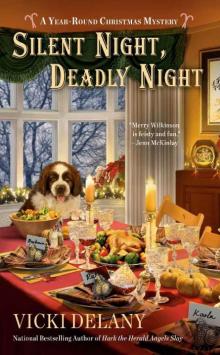 Silent Night, Deadly Night
Silent Night, Deadly Night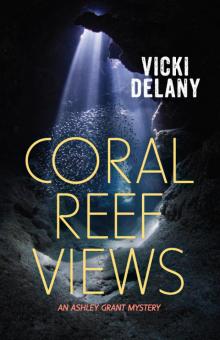 Coral Reef Views
Coral Reef Views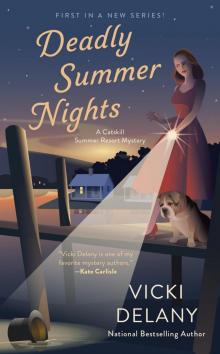 Deadly Summer Nights
Deadly Summer Nights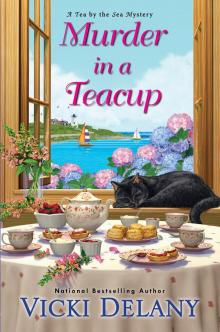 Murder in a Teacup
Murder in a Teacup Whiteout
Whiteout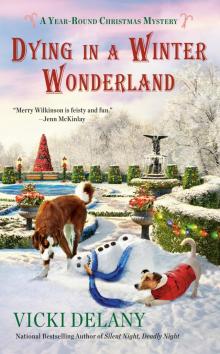 Dying in a Winter Wonderland
Dying in a Winter Wonderland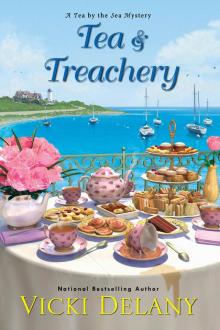 Tea & Treachery
Tea & Treachery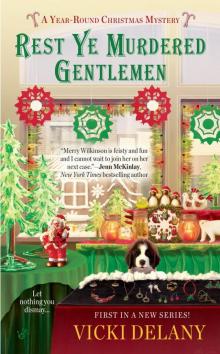 Rest Ye Murdered Gentlemen
Rest Ye Murdered Gentlemen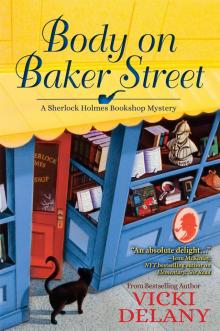 Body on Baker Street: A Sherlock Holmes Bookshop Mystery
Body on Baker Street: A Sherlock Holmes Bookshop Mystery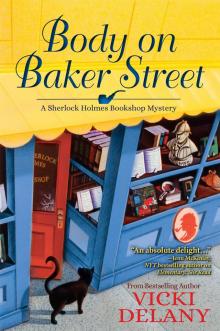 Body on Baker Street
Body on Baker Street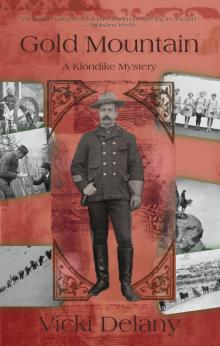 Gold Mountain
Gold Mountain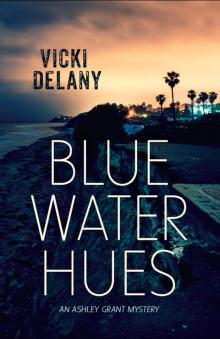 Blue Water Hues
Blue Water Hues Hark the Herald Angels Slay
Hark the Herald Angels Slay Murder at Lost Dog Lake
Murder at Lost Dog Lake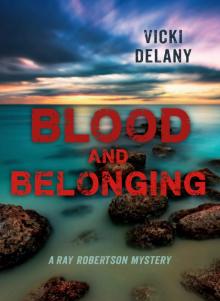 Blood and Belonging
Blood and Belonging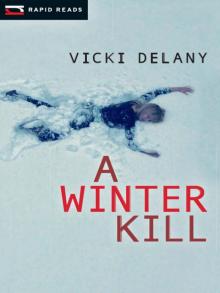 A Winter Kill
A Winter Kill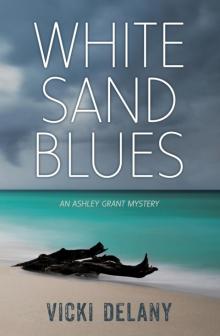 White Sand Blues
White Sand Blues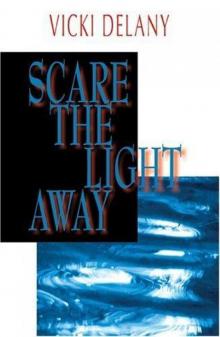 Scare the Light Away
Scare the Light Away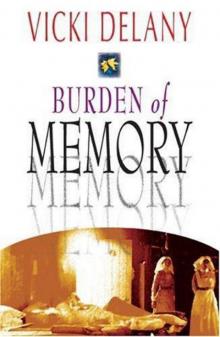 Burden of Memory
Burden of Memory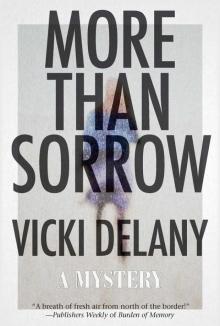 More Than Sorrow
More Than Sorrow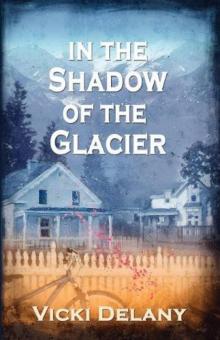 In the Shadow of the Glacier
In the Shadow of the Glacier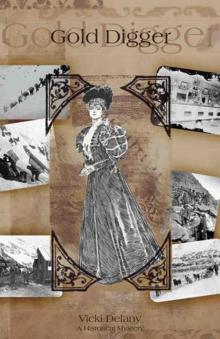 Gold Digger: A Klondike Mystery
Gold Digger: A Klondike Mystery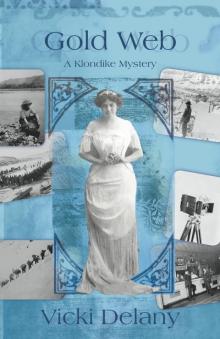 Gold Web
Gold Web Haitian Graves
Haitian Graves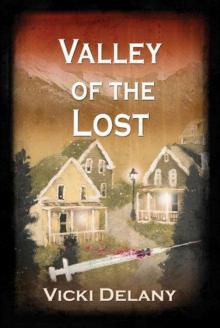 Valley of the Lost
Valley of the Lost We Wish You a Murderous Christmas
We Wish You a Murderous Christmas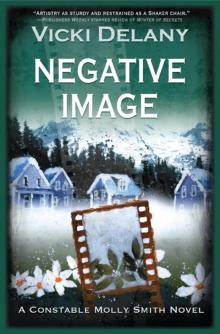 Negative Image
Negative Image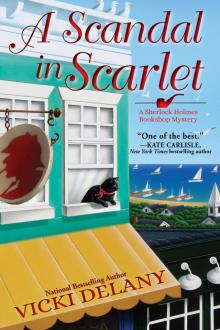 A Scandal in Scarlet
A Scandal in Scarlet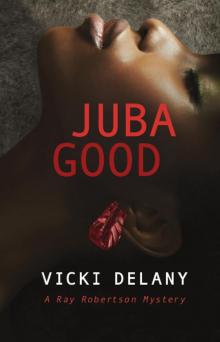 Juba Good
Juba Good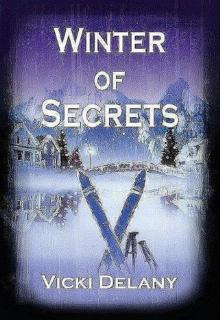 Winter of Secrets
Winter of Secrets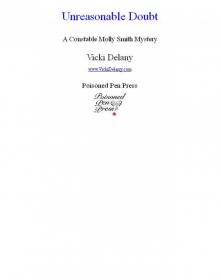 Unreasonable Doubt
Unreasonable Doubt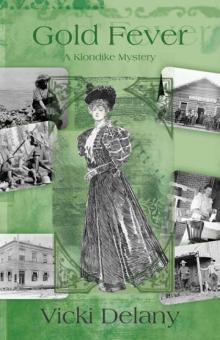 Gold Fever
Gold Fever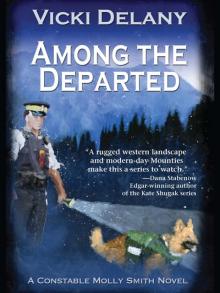 Among the Departed
Among the Departed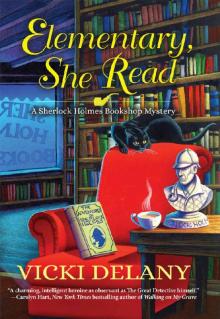 Elementary, She Read: A Sherlock Holmes Bookshop Mystery
Elementary, She Read: A Sherlock Holmes Bookshop Mystery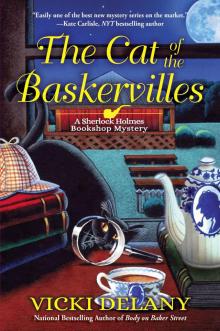 The Cat of the Baskervilles
The Cat of the Baskervilles